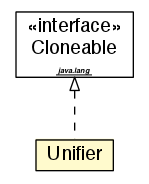
|
||||||||||
| PREV CLASS NEXT CLASS | FRAMES NO FRAMES | |||||||||
| SUMMARY: NESTED | FIELD | CONSTR | METHOD | DETAIL: FIELD | CONSTR | METHOD | |||||||||

java.lang.Objectjason.asSemantics.Unifier
public class Unifier
| Field Summary | |
|---|---|
protected java.util.HashMap<VarTerm,Term> |
function
|
| Constructor Summary | |
|---|---|
Unifier()
|
|
| Method Summary | |
|---|---|
void |
apply(Pred p)
Deprecated. use p.apply(un) instead. |
void |
apply(Term t)
Deprecated. use t.apply(un) instead. |
void |
bind(VarTerm vt1,
VarTerm vt2)
|
void |
clear()
|
Unifier |
clone()
|
void |
compose(Unifier u)
add all unifications from u |
VarTerm |
deref(VarTerm v)
|
boolean |
equals(java.lang.Object o)
|
Term |
get(java.lang.String var)
gets the value for a Var, if it is unified with another var, gets this other's value |
Term |
get(VarTerm vtp)
gets the value for a Var, if it is unified with another var, gets this other's value |
org.w3c.dom.Element |
getAsDOM(org.w3c.dom.Document document)
get as XML |
Term |
getAsTerm()
|
int |
size()
|
java.lang.String |
toString()
|
boolean |
unifies(Term t1,
Term t2)
this version of unifies undo the variables' mapping if the unification fails. |
boolean |
unifies(Trigger te1,
Trigger te2)
|
boolean |
unifiesNoUndo(Term t1g,
Term t2g)
this version of unifies does not undo the variables' mapping in case of failure. |
boolean |
unifiesNoUndo(Trigger te1,
Trigger te2)
|
protected boolean |
unifyTerms(Term t1g,
Term t2g)
|
| Methods inherited from class java.lang.Object |
|---|
finalize, getClass, hashCode, notify, notifyAll, wait, wait, wait |
| Field Detail |
|---|
protected java.util.HashMap<VarTerm,Term> function
| Constructor Detail |
|---|
public Unifier()
| Method Detail |
|---|
public void apply(Term t)
public void apply(Pred p)
public Term get(java.lang.String var)
public Term get(VarTerm vtp)
public boolean unifies(Trigger te1,
Trigger te2)
public boolean unifiesNoUndo(Trigger te1,
Trigger te2)
public boolean unifies(Term t1,
Term t2)
public boolean unifiesNoUndo(Term t1g,
Term t2g)
protected boolean unifyTerms(Term t1g,
Term t2g)
public VarTerm deref(VarTerm v)
public void bind(VarTerm vt1,
VarTerm vt2)
public void clear()
public java.lang.String toString()
toString in class java.lang.Objectpublic Term getAsTerm()
public int size()
public void compose(Unifier u)
public Unifier clone()
clone in class java.lang.Objectpublic boolean equals(java.lang.Object o)
equals in class java.lang.Objectpublic org.w3c.dom.Element getAsDOM(org.w3c.dom.Document document)
|
||||||||||
| PREV CLASS NEXT CLASS | FRAMES NO FRAMES | |||||||||
| SUMMARY: NESTED | FIELD | CONSTR | METHOD | DETAIL: FIELD | CONSTR | METHOD | |||||||||